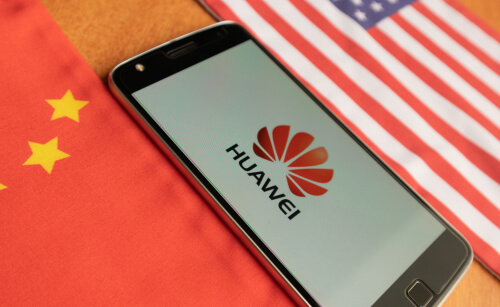When you think about a company that respects and protects intellectual property, do you picture Chinese telecom giant Huawei?
A new whitepaper authored by the company says you should.
And so does Huawei's Chief Legal Officer, Song Liuping, who announced the whitepaper at a press conference:
"Innovation and IP protection is the cornerstone of Huawei’s business success. Last year we generated more than 100 billion dollars in revenue. None of our key products or technologies are linked to any accusations of IP theft. No company can become a global leader by stealing from others."
Liuping didn't mention the Huawei employees who have been arrested for spying in various parts of the world.
And he also failed to mention the 8 Steps Huawei Took to Steal IP from T-Mobile and Cover It Up, which SecureWorld reported on previously.
And there was no discussion of Huawei's formal program that offered bonuses for employees around the world who stole IP and sent it back to Huawei headquarters in China.
We discovered that program in legal documents examined by SecureWorld:
"On July 10, 2013, Huawei China launched a formal policy instituting a bonus program to reward employees who stole confidential information from competitors... A 'competition management group' was tasked with reviewing the submissions and awarding monthly bonuses to the employees who provided the most valuable stolen information. Biannual awards were also made available to the top three regions that provided the most valuable information. The policy emphasized that no employees would be punished for taking actions in accordance with the policy."
This type of IP theft effort flies in the face of what Huawei's new whitepaper is all about.
What are the key messages from Huawei's new IP whitepaper?
Huawei's whitepaper is titled, "Respecting and Protecting Intellectual Property: The Foundation of Innovation."
You can read the paper for yourself, but allow us to share an overview. The Huawei whitepaper is broken down into four key sections:
- Sustained Innovation Is the Foundation of Huawei's Ongoing Success
- Years of Investment Translates into an Innovative Brand and a Wealth of Patents
- Huawei's Innovation Brings Huge Social Value
- Huawei Respects Third Parties' IP and Protects Its Own
We were most interested in what the company wrote about respecting the IP of other companies, given Huawei's track record.
Here are a few key statements:
"Huawei believes that protecting IP is the foundation of innovation, and has systems and processes in place to ensure that our employees
respect third parties' IP."
"As Huawei is under spotlight, we set higher standards for the
company as well as our employees when it comes to the protection
of IP and trade secrets, and have systematic management systems in
place."
"Since its inception, Huawei has issued many regulations to
protect third-party IP... these regulations place clear and detailed requirements for strictly protecting third parties' confidential information, commercial software, patents, trademarks as well as other forms of IP in our business activities."
"All recruitment candidates are required to sign an IP and trade
secret protection commitment letter during their interview and
on-boarding. The purpose of this is to ensure that the individuals
clearly understand that Huawei respects the confidential
information of other companies and individuals."
Now that we know a little bit about what Huawei is saying, let's look at the possible motivations behind these statements.
What is the purpose of Huawei statement on intellectual property?
Why did Huawei issue this whitepaper?
It's part of a positive public relations effort to reach technology, cybersecurity, and government leaders, to be sure. And people in those circles are much more likely to read a "whitepaper" than a "press release."
As a journalist for several decades, I've seen companies use tactics like these time and again when they are on the hot seat.
And as far as specific motivations, there appear to be two that really stand out.
The first is Huawei's fear of having patents stripped from the company. Huawei's Chief Legal Officer specifically addressed this during his presentation:
"Huawei fully supports the IPR (Intellectual Property Rights) protection system, both globally and in the United States. IP is private property, defined by the US Constitution. If politicians use IP as a political tool, they will destroy confidence in the patent protection system. If some governments selectively strip companies of their IP, it will break the foundation of global innovation."
That should strike a chord with American leaders, don't you think? Huawei only wants rights spelled out by the US Constitution.
And the second specific motivation, beyond this short-term worry, is around 5G. Huawei claims to have done more R&D on 5G than all other EU and US companies combined.
And the Chief Legal Officer made yet another company pitch for moving forward with 5G built by Huawei:
"As always, Huawei is ready and willing to share our technology with the world. That includes 5G. It includes US companies and US consumers. Together, we can drive our industry forward and advance technology for all mankind."
If you are looking for an overall theme from this kind of effort, what Huawei is really trying to say in its whitepaper is this: "You can trust us."
Can the world trust Huawei 5G?
Trust is essential in a 5G environment.
SecureWorld attended a press briefing with Rob Joyce, Senior Cybersecurity Adviser at the NSA, on this very topic. Here is what he said:
"When I say trust, there’s a desire to examine it. We will work hard on standards and on examining products. But I can tell you with the two hats we have at NSA—both the information assurance, cybersecurity hat and the foreign intelligence hat—it is really hard with something of that size and magnitude to lock it down where it can’t be exploited.
So you need to have a trust relationship with the people who build the house. If it's built without a solid foundation, you're going to be unhappy with the way that turns out.
And that's how we view it in the 5G discussion. It really isn't about the 'show me the smoking gun intelligence' about how they're going to steal my information, it's 'can I trust it and what are we going to rely on that for?'. It is going to be something so intertwined with our society."
Intertwined and built by tech companies.
We just don't know which ones.
RELATED:
FedEx Sues US Government Over Huawei Ban
Huawei Fears: Company Buying Undersea Data Cables
Cyber Attack Motivations: China vs. Russia




